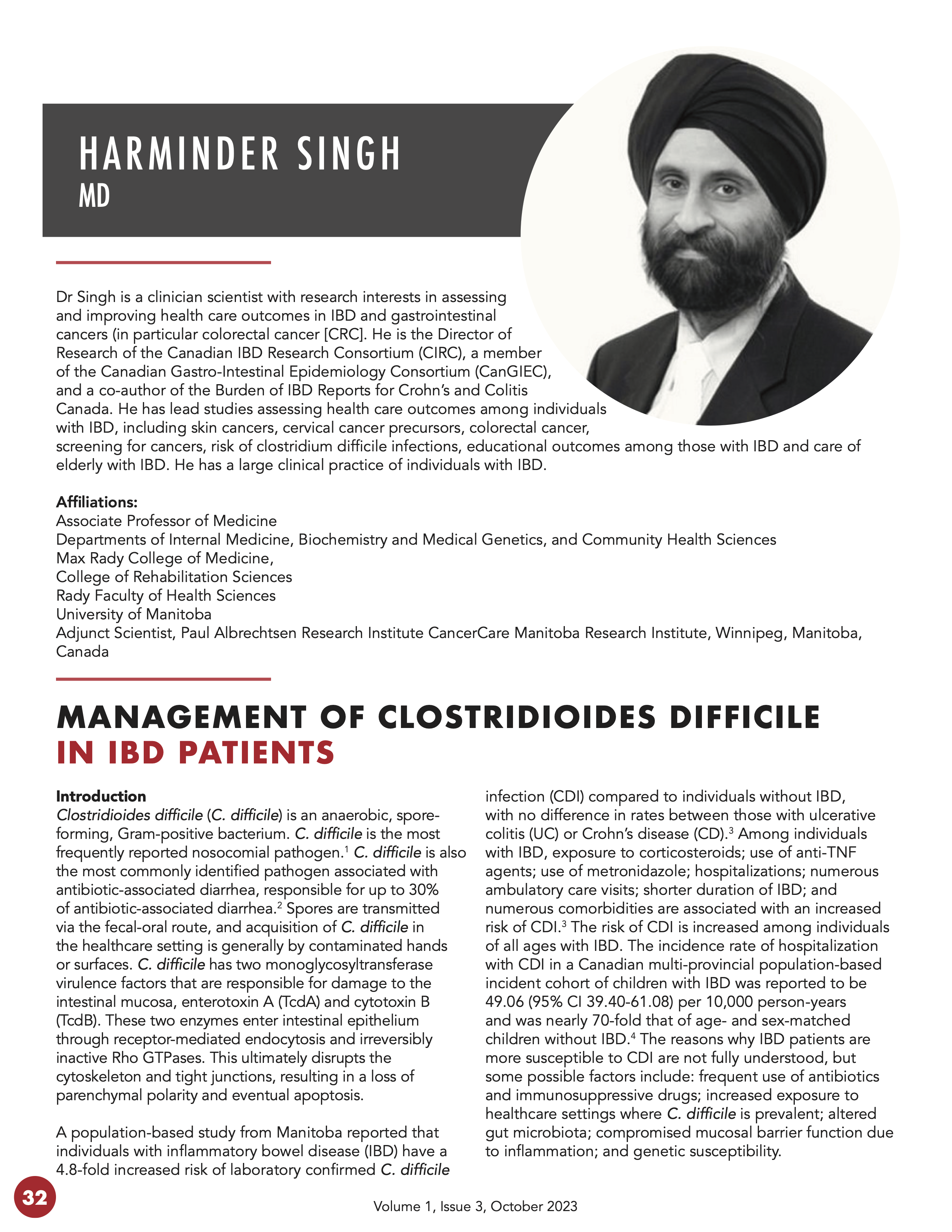Management of Clostridioides Difficile in IBD Patients
DOI:
https://doi.org/10.58931/cibdt.2023.1319Abstract
Clostridioides difficile (C. difficile) is an anaerobic, spore-forming, Gram-positive bacterium. C. difficile is the most frequently reported nosocomial pathogen. C. difficile is also the most commonly identified pathogen associated with antibiotic-associated diarrhea, responsible for up to 30% of antibiotic-associated diarrhea. Spores are transmitted via the fecal-oral route, and acquisition of C. difficile in the healthcare setting is generally by contaminated hands or surfaces. C. difficile has two monoglycosyltransferase virulence factors that are responsible for damage to the intestinal mucosa, enterotoxin A (TcdA) and cytotoxin B (TcdB). These two enzymes enter intestinal epithelium through receptor-mediated endocytosis and irreversibly inactive Rho GTPases. This ultimately disrupts the cytoskeleton and tight junctions, resulting in a loss of parenchymal polarity and eventual apoptosis.
References
Leffler DA, Lamont JT. Clostridium difficile Infection. N Engl J Med. Jul 16 2015;373(3):287-8. doi:10.1056/NEJMc1506004 DOI: https://doi.org/10.1056/NEJMc1506004
Barbut F, Petit JC. Epidemiology of Clostridium difficile-associated infections. Clin Microbiol Infect. Aug 2001;7(8):405-10. doi:10.1046/j.1198-743x.2001.00289.x DOI: https://doi.org/10.1046/j.1198-743x.2001.00289.x
Singh H, Nugent Z, Yu BN, L et al. Higher incidence of Clostridium difficile infection among Individuals With inflammatory bowel disease. Gastroenterology. Aug 2017;153(2):430-438 e2. doi:10.1053/j.gastro.2017.04.044 DOI: https://doi.org/10.1053/j.gastro.2017.04.044
Kuenzig ME, Benchimol EI, Bernstein CN, et al. Hospitalization With Clostridioides difficile in pediatric inflammatory bowel disease: a population-based study. J Pediatr Gastroenterol Nutr. Aug 1 2022;75(2):173-180. doi:10.1097/MPG.0000000000003489 DOI: https://doi.org/10.1097/MPG.0000000000003489
Navaneethan U, Mukewar S, Venkatesh PG, et al. Clostridium difficile infection is associated with worse long term outcome in patients with ulcerative colitis. J Crohns Colitis. Apr 2012;6(3):330-6. doi:10.1016/j.crohns.2011.09.005 DOI: https://doi.org/10.1016/j.crohns.2011.09.005
Tariq R, Law CCY, Khanna S, et al. The Impact of Clostridium difficile Infection on mortality in patients with inflammatory bowel disease: a systematic review and meta-analysis. J Clin Gastroenterol. Feb 2019;53(2):127-133. doi:10.1097/MCG.0000000000000968 DOI: https://doi.org/10.1097/MCG.0000000000000968
Berg AM, Kelly CP, Farraye FA. Clostridium difficile infection in the inflammatory bowel disease patient. Inflamm Bowel Dis. Jan 2013;19(1):194-204. doi:10.1002/ibd.22964 DOI: https://doi.org/10.1002/ibd.22964
Beniwal-Patel P, Stein DJ, Munoz-Price LS. The juncture between Clostridioides difficile infection and inflammatory bowel diseases. Clin Infect Dis. Jul 2 2019;69(2):366-372. doi:10.1093/cid/ciz061 DOI: https://doi.org/10.1093/cid/ciz061
Crobach MJT, Vernon JJ, Loo VG, et al. Understanding Clostridium difficile colonization. Clin Microbiol Rev. Apr 2018;31(2)doi:10.1128/CMR.00021-17 DOI: https://doi.org/10.1128/CMR.00021-17
Clayton EM, Rea MC, Shanahan F, et al. The vexed relationship between Clostridium difficile and inflammatory bowel disease: an assessment of carriage in an outpatient setting among patients in remission. Am J Gastroenterol. May 2009;104(5):1162-9. doi:10.1038/ajg.2009.4 DOI: https://doi.org/10.1038/ajg.2009.4
Kelly CR, Fischer M, Allegretti JR, et al. ACG Clinical Guidelines: Prevention, Diagnosis, and Treatment of Clostridioides difficile Infections. Am J Gastroenterol. Jun 1 2021;116(6):1124-1147. doi:10.14309/ajg.0000000000001278 DOI: https://doi.org/10.14309/ajg.0000000000001278
McDonald LC, Gerding DN, Johnson S, et al. Clinical Practice Guidelines for Clostridium difficile Infection in Adults and Children: 2017 Update by the Infectious Diseases Society of America (IDSA) and Society for Healthcare Epidemiology of America (SHEA). Clin Infect Dis. Mar 19 2018;66(7):e1-e48. doi:10.1093/cid/cix1085 DOI: https://doi.org/10.1093/cid/cix1085
Parnell JM, Fazili I, Bloch SC, et al. Two-step testing for Clostridioides difficile is inadequate in differentiating infection from colonization in children. J Pediatr Gastroenterol Nutr. Mar 1 2021;72(3):378-383. doi:10.1097/MPG.0000000000002944 DOI: https://doi.org/10.1097/MPG.0000000000002944
Polage CR, Gyorke CE, Kennedy MA, et al. Overdiagnosis of Clostridium difficile infection in the molecular test era. JAMA Intern Med. Nov 2015;175(11):1792-801. doi:10.1001/jamainternmed.2015.4114 DOI: https://doi.org/10.1001/jamainternmed.2015.4114
Sandlund J, Estis J, Katzenbach P, et al. Increased clinical specificity with ultrasensitive detection of Clostridioides difficile toxins: reduction of overdiagnosis compared to nucleic acid amplification tests. J Clin Microbiol. Nov 2019;57(11)doi:10.1128/JCM.00945-19 DOI: https://doi.org/10.1128/JCM.00945-19
Jiang Y, Sarpong EM, Sears P, et al. Budget impact analysis of fidaxomicin versus vancomycin for the treatment of Clostridioides difficile infection in the United States. Infect Dis Ther. Feb 2022;11(1):111-126. doi:10.1007/s40121-021-00480-0 DOI: https://doi.org/10.1007/s40121-021-00480-0
Stranges PM, Hutton DW, Collins CD. Cost-effectiveness analysis evaluating fidaxomicin versus oral vancomycin for the treatment of Clostridium difficile infection in the United States. Value Health. Mar-Apr 2013;16(2):297-304. doi:10.1016/j.jval.2012.11.004 DOI: https://doi.org/10.1016/j.jval.2012.11.004
Feuerstadt P, Louie TJ, Lashner B, et al. SER-109, an oral microbiome therapy for recurrent Clostridioides difficile infection. N Engl J Med. Jan 20 2022;386(3):220-229. doi:10.1056/NEJMoa2106516 DOI: https://doi.org/10.1056/NEJMoa2106516

Published
How to Cite
Issue
Section
License
Copyright (c) 2023 Canadian IBD Today

This work is licensed under a Creative Commons Attribution-NonCommercial-NoDerivatives 4.0 International License.
